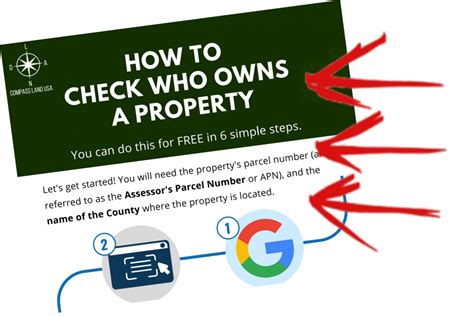How to Find Who Owns a Property: A Comprehensive Guide
Finding out who owns a property might seem like a daunting task, but with the right resources and strategies, it's surprisingly straightforward. Whether you're a prospective buyer, a curious neighbor, or conducting research for a business project, this guide will walk you through the various methods available.
Understanding Property Ownership Records
Property ownership information is typically a matter of public record. This means the details are accessible to anyone, although the process for accessing them varies depending on your location. These records usually contain crucial information, including:
- Owner's Name(s): The legal name(s) of the property owner(s).
- Property Address: The full address of the property in question.
- Legal Description: A precise description of the property's boundaries.
- Purchase Date: The date the current owner(s) acquired the property.
- Mortgage Information (Sometimes): Details about any outstanding mortgages on the property.
Methods to Find Property Owners
Several methods can help you uncover property ownership details. Here are some of the most effective:
1. County Assessor's Office/Recorder's Office
This is your primary source for property ownership information. Each county maintains records of all properties within its jurisdiction. You can typically access these records online through the county's website or by visiting the office in person. Search using the property address. Many counties offer free online access, while some may charge a small fee.
2. Online Property Search Websites
Numerous websites aggregate public property records, making it easier to find ownership details. Popular options include:
- Zillow: Known for its comprehensive real estate information, Zillow often displays property owner names. However, the accuracy can vary, and the information might not always be completely up-to-date.
- Realtor.com: Similar to Zillow, Realtor.com provides property details, sometimes including owner information. Always verify information from these sites with official county records.
- Other specialized property search websites: Many state or regionally focused websites also offer property search capabilities. Search online for "[your state/county] property records".
Important Note: While convenient, online sources should be considered supplementary. Always verify the information obtained from these websites with official county records for accuracy.
3. Public Records Request (Formal Method)
For more complex searches or to obtain highly detailed information, filing a formal public records request with the county is necessary. This usually involves filling out a form and potentially paying a fee. This method ensures you receive the most accurate and comprehensive information.
4. Title Companies
Title companies handle property title searches as part of real estate transactions. If you're involved in a property purchase or sale, the title company will be able to provide you with precise ownership details.
5. Neighborhood Inquiries (Informal Method)
While not a guaranteed method, speaking with neighbors might provide clues about the property owner. This method should only be used as a last resort and is not reliable for obtaining definitive information.
Tips for Successful Property Owner Searches
- Use the precise property address: Typos can lead to inaccurate results.
- Be patient: Locating information may require some time and effort.
- Verify information: Always double-check details from multiple sources.
- Respect privacy: Remember that property ownership information is public, but the owner's privacy should still be respected. Avoid harassment or unauthorized contact.
Finding the owner of a property is achievable through various accessible methods. By utilizing both online resources and official county records, you can confidently determine who owns any property you are investigating. Remember to always respect privacy and use this information responsibly.
